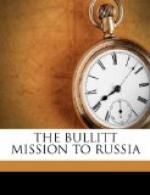by speeches. He sincerely trusted that they
would accept President Wilson’s proposal as it
now stood.
M. Orlando agreed that the question was a very difficult one for the reasons that had been fully given. He agreed that Bolshevism constituted a grave danger to all Europe. To prevent a contagious epidemic from spreading, the sanitarians set up a cordon Sanitaire. If similar measures could be taken against Bolshevism, in order to prevent its spreading, it might be overcome, since to isolate it meant vanquishing it. Italy was now passing through a period of depression, due to war weariness. But Bolshevists could never triumph there, unless they found a favourable medium, such as might be produced either by a profound patriotic disappointment in their expectations as to the rewards of the war, or by an economic crisis. Either might lead to revolution, which was equivalent to Bolshevism. Therefore, he would insist that all possible measures should be taken to set up this cordon. Next, he suggested the consideration of repressive measures. He thought two methods were possible; either the use of physical force or the use of moral force. He thought Mr. Lloyd George’s objection to the use of physical force unanswerable. The occupation of Russia meant the employment of large numbers of troops for an indefinite period of time. This meant an apparent prolongation of the war. There remained the use of moral force. He agreed with M. Clemenceau that no country could continue in anarchy and that an end must eventually come; but they could not wait; they could not proceed to make peace and ignore Russia. Therefore, Mr. Lloyd George’s proposal, with the modifications introduced after careful consideration by President Wilson and M. Clemenceau, gave a possible solution. It did not involve entering into negotiations with the Bolsheviks; the proposal was merely an attempt to bring together all the parties in Russia with a view to finding a way out of the present difficulty. He was prepared, therefore, to support it.
President Wilson asked
for the views of his Japanese
colleagues.
Baron Makino said that after carefully considering the various points of view put forward, he had no objections to make regarding the conclusions reached. He thought that was the best solution under the circumstances. He wished, however, to enquire what attitude would be taken by the Representatives of the Allied powers if the Bolshevists accepted the invitation to the meeting and there insisted upon their principles. He thought they should under no circumstances countenance Bolshevist ideas. The conditions in Siberia East of the Baikal had greatly improved. The objects which had necessitated the despatch of troops to that region had been attained. Bolshevism was no longer aggressive, though it might still persist in a latent form. In conclusion, he wished to support the proposal before the meeting.




